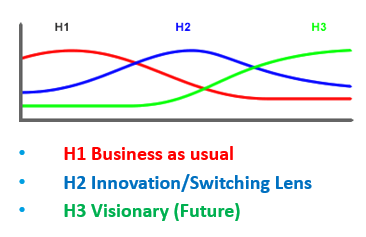Strategic Planning: Three Horizons
About Three Horizons
‘Three Horizons’ is a tool for building a long term vision for a system and the steps required to get there. It shows how different pieces of work can help make long-term changes.
The Three Horizons model describes three distinct focal points of activity. They all have their own benefits but it's important to see how they fit together to become ‘greater than the sum of their parts’.
This tool can help you look at and improve the current ways of working with ongoing improvement. It can also help you change from one way of working to another, opening and closing different paths.
One challenge in making changes is knowing if something is really changing how things are done or just making small tweaks. The Three Horizons tool can help you think about what changes are required. It shows you how to shift away from things that are not working. It also helps you move towards a more integrated model of care.
This will enable better alignment of workstreams and a more planned approach to system-wide change. Through this approach you can:
- Plan for change across a range of services and workstreams.
- Explore what needs to happen in the medium term to start to move towards the ideal state.
- Help distinguishing between transformational and incremental change to clarify assumptions regarding progress towards the third horizon.
HIS has created a resource to help people understand how the Three Horizons can support change. It includes a description of the Three Horizons and how you might develop a workshop to explore your horizons.

Supporting resources for this tool
Supporting protocol – how you might use this tool:
When looking at developing and implementing a local mental health and substance use protocol, this tool can:
-
Help understand and organise the wide range of ongoing work in mental health and substance use, that can often be siloed.
-
Help with prioritisation of efforts, including identifying things it is important to stop doing.
-
Map out the change process to communicate how smaller changes contribute to wider goals.
This will help start conversations to shape ideas around how disparate work programmes in mental health and substance use can be brought together. This can then create approaches to change and support communication/buy-in around long-term change.
